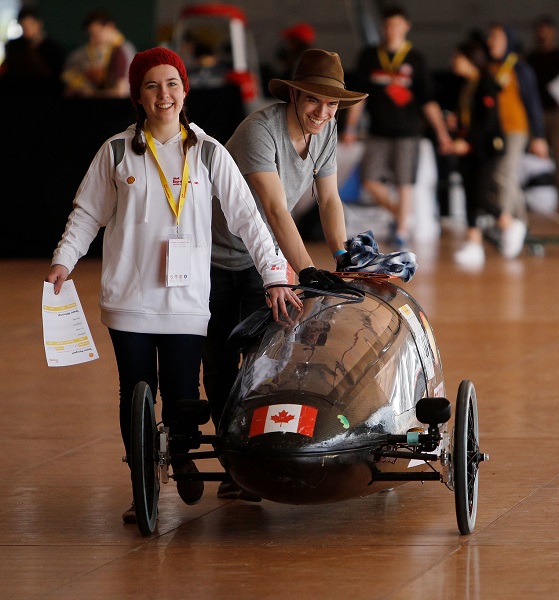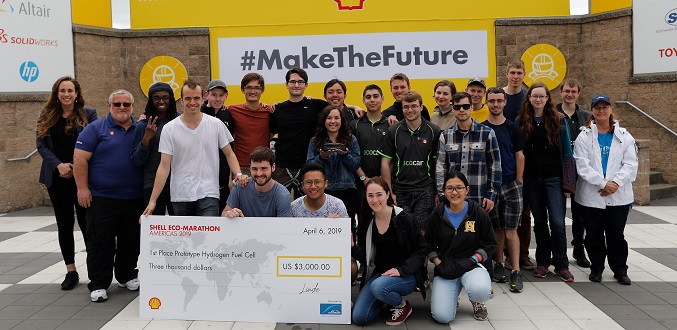
EcoCar Team driver, Erin Whitby, and Project Manager, Carter Trautmann, with the winning car, Sophie
When last we saw them, the University of Alberta's EcoCar team was preparing to leave for the Shell Eco-marathon Americas in Sonoma, California from April 3-6, 2019. Now they have returned - victorious. The team took first place on the track in the prototype-hydrogen category, achieving the energy equivalence of 1895 MPG (US) to earn the competition's efficiency award. They also won the Fuel Cell Vehicle Innovation Prize.
The team had an auspicious start to the competition.
"We swept through the initial technical inspection," says Carter Trautman, the EcoCar Team's project manager. "And because we passed that we had time for a few test runs before the competition."
The test runs helped the team identify issues with the car, the biggest one being that it was too slow.
"We were 13 seconds slow on each lap, so that's a lot of time," says Trautmann.
The team set to work to address the issue with minor modifications, like inflating the tires to be ready for the first day of competition.
With these minor modifications they took their first run on Friday and they were still slow. The team's efforts were frustrated further when their second run was rained out. The team's last runs of the day were still slow and marred by steering trouble, so they spent that night conditioning the fuel cell and making minor modifications to the engine.
"The whole team was amazing," says Trautmann. "We had so many technical issues and people were consistently excited to get in there and see what they could do. It was amazing to see."
The night's work proved worthwhile and the team's driver, Erin Whitby, who will be the team's fuel cell lead next year, skimmed 15-20 seconds off their lap times.
"We were just so happy to be finishing the course," says Trautmann.
"But then on the last run of the day, we found out we were the most efficient," adds Elizabeth Gierl, the team's fuel cell co-lead. "Which was the icing on the cake."

U of A EcoCar Team with their prize
The team was also awarded the Marathon's award for most innovative hydrogen fuel cell vehicle team with new members.
The team celebrated their successes with a quiet dinner at a Mexican restaurant that night.
"We were all so drained from the ups and downs of the competition," says Gierl. "And we all had to fly home the next morning, so it was a quiet, early night."
Returning to Edmonton, team members had to immediately focus on wrapping up course work and preparing for final exams.
"I slept for 13 hours my first night back," says Trautmann. "But I've been really busy since then."
The car will return to Edmonton on April 15 but the team will set it aside and begin to develop a new car to enter in the Marathon's "urban concept" category, rather than the prototype category they entered this year. The team is also looking forward to finally using a fuel cell they have had in development for over two years.
"We've been developing this fuel cell with Dr. Secanell-Gallart's lab and it is nearly ready to go," says Gierl.
The team relies on its faculty supervisors, Dr. Marc Secanell-Gallart and Dr. Pierre Mertiny for advice and technical support in all their work.
"Professor Mertiny is always there for us," says Trautmann. "If we need him, any time, we can email and ask."
The team is always open to new members and will hold their annual recruitment drive in September.
"Our purpose is not even to win the Marathon," says Gierl. "It's really about learning and teaching and providing students the opportunity to apply their education."
"We have an amazing team," adds Trautmann. "The people on the team are the reason for our success."